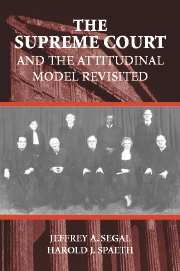Book contents
- Frontmatter
- Contents
- List of Illustrations
- List of Tables
- Preface
- 1 Introduction: Supreme Court Policy Making
- 2 Models of Decision Making: The Legal Model
- 3 Models of Decision Making: The Attitudinal and Rational Choice Models
- 4 A Political History of the Supreme Court
- 5 Staffing the Court
- 6 Getting into Court
- 7 The Decision on the Merits: The Legal Model
- 8 The Decision on the Merits: The Attitudinal and Rational Choice Models
- 9 Opinion Assignment and Opinion Coalitions
- 10 The Supreme Court and Constitutional Democracy
- 11 Conclusion
- Case Index
- General Index
9 - Opinion Assignment and Opinion Coalitions
Published online by Cambridge University Press: 05 June 2012
- Frontmatter
- Contents
- List of Illustrations
- List of Tables
- Preface
- 1 Introduction: Supreme Court Policy Making
- 2 Models of Decision Making: The Legal Model
- 3 Models of Decision Making: The Attitudinal and Rational Choice Models
- 4 A Political History of the Supreme Court
- 5 Staffing the Court
- 6 Getting into Court
- 7 The Decision on the Merits: The Legal Model
- 8 The Decision on the Merits: The Attitudinal and Rational Choice Models
- 9 Opinion Assignment and Opinion Coalitions
- 10 The Supreme Court and Constitutional Democracy
- 11 Conclusion
- Case Index
- General Index
Summary
The decision on the merits merely indicates whether the ruling of the court whose decision the Supreme Court reviewed is affirmed or reversed and, consequently, which party has won and which has lost. The opinion of the Court, by comparison, constitutes the core of the Court's policymaking process. It specifies the constitutional and legal principles on which the majority rests its decision; it guides the lower courts in deciding future cases; and it establishes precedents for the Court's own subsequent rulings – even if such decisions and their supporting opinions can be overturned by future Supreme Courts.
Justice Dooley of the Vermont Supreme Court, concurring in the first state supreme court decision to void state marriage laws because they exclude same-sex partnerships – Baker v. State, No. 98–03 (1999) – states the matter very well:
I recognize to most observers the significance of this decision lies in its result and remedy. In the cases that come before us in the future, however, the significance of this case will lie in its rationale – that is, how we interpret and apply … the Vermont Constitution. Moreover, in this, the most closely-watched opinion in this Court's history, its acceptability will be based on whether its reasoning and result are clearly commanded … and whether it is a careful … exercise of the Court's … powers. I do not believe that the majority's rationale meets this … standard, and I fear how it may be applied – or ignored – in the future.
- Type
- Chapter
- Information
- The Supreme Court and the Attitudinal Model Revisited , pp. 357 - 405Publisher: Cambridge University PressPrint publication year: 2002



